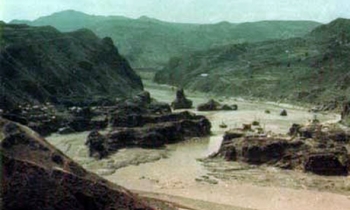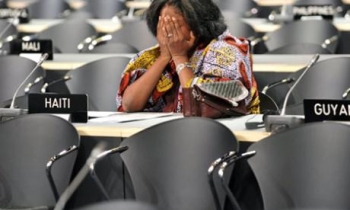BEIRUT: It's been said that the vibrancy of a city's media culture is a good indication of that city's quality of life. A metropolis with a lot of magazines is a metropolis with a lot going on.
If one were to survey the newsstands in Beirut earlier this summer, one would have been impressed with the number of new and established titles on display - a spate of fashion rags, business journals and lifestyle publications, all tailored to the Lebanese capital and reflective of its energy and vitality.
But the outbreak of war (and the continuation of an air and sea blockade) has put the magazine industry in peril, as it has so many sectors of Lebanon's economy and culture.
"This month's magazine has all the tools you need to have a great July and August," Time Out Beirut's editor in chief wrote in the preface to the magazine's July edition.
But the tools Ramsay Short suggested for a "great July and August" became useless on July 12 when Israel launched its offensive against Lebanon, turning the promise of a great season into death, destruction, a state of siege and many shattered plans.
Instead of reviewing the country's summer music festivals in Time Out Beirut, writing about the capital's real-estate boom in Executive, or profiling the region's emerging fashion designers in Elle Orient, many magazines in Beirut have been forced to either suspend publication or reduce their number of printed pages. As the war was raging, a notice went up on the Time Out Beirut Website: "Beirut's favorite entertainment and listings magazine is now suspended. Lebanon is being, once again, used as a battleground for a war that neither its government nor its people want. They are killing our city."
Time Out Beirut was launched four months before the war broke out.
"We are hoping for a fast recovery and rest assured we will come back, stronger and bolder than ever. It is in our Lebanese character to do so," the Website missive adds.
Almost instantly, the magazine's July issue became a testament to what life in Beirut was like before, and something of a collectors' item.
Six staff members of the newly established Elle Orient spent the 34-day war hiding out in a "safe place," editor in chief Desiree Sadek wrote in an email to her counterpart at the US edition of Elle, Roberta Myers.
Elle Orient was launched just a few days before Israel began its bombing campaign. The magazine was going to be based in Lebanon, with issues appearing monthly in both Arabic and French editions that would be distributed to Syria, Jordan, Tunisia and Morocco.
"We don't really know what tomorrow will bring, but we continue to work because we will be very depressed if we don't," Sadek explained to Myers in late July. She added that her Lebanese staff would try to "prepare a special edition with a supplement about all this [war] and the courage of women and children who are dying under the attacks."
But neither the special edition nor the supplement saw the light of day. "We prepared the supplement but there was not enough material for the special edition itself, so we cancelled it," says Sadek.
Elle Orient is scheduled to resume publication with an October issue that will focus primarily on the war and its repercussions, in addition to regular content, such as beauty tips, fashion commentary and other feminine concerns.
"We are not a news magazine like Paris Match or Newsweek," Sadek explains. "We write about beauty, fashion, hair ... But I cannot turn a blind eye and ignore what happened. I have to be in touch with everything that relates to the Orient. I want to emphasize that Elle is sensible but also intelligent. [The magazine's] heart is 100 percent Oriental and 300 percent Lebanese."
But not all of the magazines that suspended publication in Lebanon will return to the newsstands by October.
"We suspended our publication because we are doomed by our name," says Ramzi al-Hafez, editor in chief of Lebanon Opportunities, a monthly English-language business magazine.
"For a magazine to be successful, we need advertising, which disappeared. We need reporters, who fled. We need readers, who are companies in our case which closed. And we need stories, which are not there," he explains.
"We are an information-providing magazine, crucial information that you don't find somewhere else. Today we are not able to provide this information because it simply does not exist," he says. "We don't want to say things are great when they are not."
Although Hafez does not know when he will able to resume publishing, he says he is "very bullish about Lebanon and we believe it will have a great comeback."
Noun, a monthly French-language glossy, published its September issue 27 days later that planned, and with fewer pages.
"We came out on August 30 but with different content than the usual because we thought it would be indecent to report on parties, fashion and entertainment in times of war. We simply were not able to do it out of decency," says editor in chief Collette Shibani.
She says that even though the issue has fewer pages and less advertising, it has elicited very positive feedback from the magazine's readers.
"Our readers called to compliment us on the issue, which they labeled as very respectful," she says.
"But October's issue will return to its former content because people are fed up with news about the war," she adds. "We want to offer them something light that will take them out of their sadness."
Another Beirut-based fashion title, the bimonthly magazine Aishti, put out a notably slimmer issue for August/September, clocking in at just 144 pages, compared to 336 for the same edition last year. An average issue of the magazine runs between 236 and 268 pages. The August/September issue is, in effect, a love letter to Lebanon, with the cover tag "Lebanon: My Immortal Beloved" below a model posed in front of the old Holiday Inn and an unmistakable Beirut taxi. Aishti staffers would not comment on the magazine's post-war plans.
Executive, another English-language business magazine, published its August issue on time - during the fighting - but also with fewer pages and different content.
"It was silly to publish articles about industries when most industries closed, so we dedicated the whole issue to analysis of the economic, socioeconomic and political economy situation in Lebanon," says Executive editor in chief Yasser Akkaoui.
The August issue is just 40 pages instead of 120, with five ads instead of 45. But it offers a tight, focused and remarkably responsive analysis on the war, how it started and how it was developing at press time.
"We are still around five ads for this month, but we don't care, we really don't care," says Akkaoui. "It is not about the money. It is about making a statement and proving that we are still in the market and still committed."
The October issue of Executive will also be thin because, Akkaoui says, there isn't enough material to fill 120 pages. It will focus on aid, the repercussions of the war, post-war government policies and Hizbullah.
"We will cover the post-war effects on the economy and on corporate Lebanon," says Akkaoui. "We will provide [information and analysis for] readers worried about their investments, facts and figures that could give insight on how to further develop their businesses.
"If the media is the fourth estate," he argues, "then it is during hard times when it should prove it."









